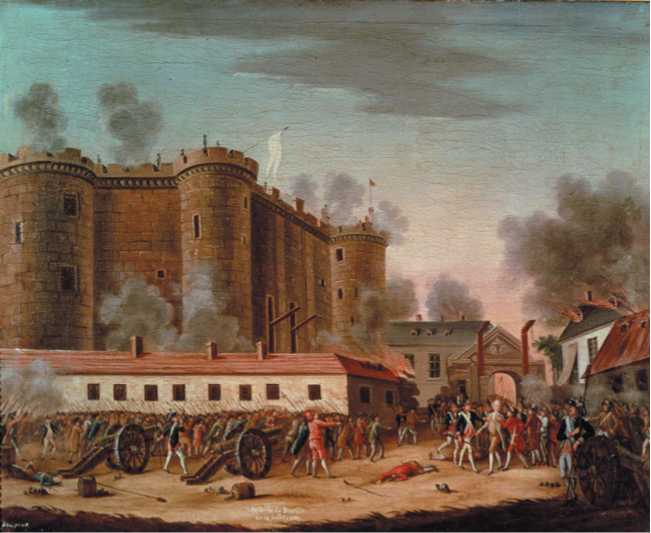Yet Jefferson completed the construction of the political institution known as the Republican party and the philosophy of government known as Jeffersonian democracy. From what sort of materials had he built his juggernaut? In part his success was a matter of personality; he was perfectly in tune with the thinking of his times. The colonial American had practiced democracy without really believing in it, for example, the maintenance of property qualifications for voting in regions where nearly everyone owned property. Stimulated by the libertarian ideas of the Revolution, Americans were rapidly adjusting their beliefs to conform with their practices. However, it took Jefferson, possessed of the general prejudice in favor of the old-fashioned citizen rooted in the soil, yet deeply committed to majority rule, to oversee the transition.
Jefferson’s marvelous talents as a writer help explain his success. He expounded his ideas in language that few people could resist. He had a remarkable facility for discovering practical arguments to justify his beliefs—as when he suggested that by letting everyone vote, elections would be made more honest because with large numbers going to the polls, bribery would become prohibitively expensive.
Jefferson prepared the country for democracy by proving that a democrat could establish and maintain a stable regime. The Federalist tyranny of 1798 was compounded of selfishness and stupidity, but it was also based in part on honest fears that an egalitarian regime would not protect the fabric of society from hotheads and crackpots. The impact of the French Revolution on conservative thinking in the mid-1790s cannot be overestimated. America had fought a seven-year revolution without executing a single Tory, yet during the few months that the Reign of Terror ravaged France, nearly 17,000 persons were officially put to death for political “crimes” and many thousands more were killed in
Table 6.1 Jeffersonian Doctrine: Small Federal Government
Measure | Advantages | Disadvantages |
Repealed whiskey and other taxes on imports (excise) | Reduced taxes | Lowered federal revenue |
Curtailed military and naval spending | Reduction in federal debt | Weak navy: Foreign powers could "impress" American sailors and seize American ships |
Embargo Act (1807): no export trade | End to humiliations at the hand of British and French warships | Collapse of foreign trade, weakening of economy, increased smuggling |

The storming of the Bastille in 1789. After the crowd seizes the fortification, they tear it down, stone by stone.
Civil disturbances. Worse, in the opinion of many, the French extremists had attempted to destroy Christianity, substituting for it a “cult of reason.” They confiscated property, imposed price controls, and abolished slavery in the French colonies. Little wonder that many Americans feared that the Jeffersonians, lovers of France and of liberte, egalite, fraternite, would try to remodel American society in a similar way.
Jefferson calmed these fears. “Pell-mell” might scandalize the British and Spanish ministers and a few locals, but it was scarcely revolutionary. The most partisan Federalist was hard put to see a Robespierre, leader during the Reign of Terror in France, in the amiable Jefferson scratching out state papers at his desk or chatting with a Kentucky congressman at a “republican” dinner party. Furthermore, Jefferson accepted Federalist ideas on public finance, even learning to live with Hamilton’s bank. As a good democrat, he drew a nice distinction between his own opinions and the wishes of the majority, which he felt must always take priority. Even in his first inaugural he admitted that manufacturing and commerce were, along with agriculture, the “pillars of our prosperity,” and while believing that these activities would thrive best when “left most free to individual enterprise,” he accepted the principle that the government should protect them when necessary from “casual embarrassments.” During his term the country grew and prospered, the commercial classes sharing in the bounty along with the farmers so close to Jefferson’s heart. Blithely he set out to win the support of all who could vote. “It is material to the safety of Republicanism,” he wrote in 1803, “to detach the mercantile interests from its enemies and incorporate them into the body of its friends.” Thus Jefferson undermined the Federalists all along the line. They had said that the country must pay a stiff price for prosperity and orderly government, and they demanded prompt payment in full, both in cash (taxes) and in the form of limitations on human liberty. Under Jefferson these much-desired goals had been achieved cheaply and without sacrificing freedom. A land whose riches could only be guessed at had been obtained without firing a shot and without burdening the people with new taxes. “What farmer, what mechanic, what laborer, ever sees a taxgatherer of the United States?” the president could ask in 1805, without a single Federalist rising to challenge him. Order without discipline, security without a large military establishment, prosperity without regulatory legislation, freedom without license—truly the Sage of Monticello appeared to have led his fellow Americans into a golden age.
Jefferson insisted that one of his chief accomplishments had been to reduce the national debt from $83 million to $57 million. Writing from Monticello shortly after leaving office, he urged his successors to eliminate the remainder. “The discharge of the public debt,” he warned Treasury Secretary Gallatin, “is vital to the destinies of our government.”
Yet Jefferson had also learned the perils of an inadequately funded government. His unwillingness to build a real navy had rendered the nation vulnerable to foreign states. Conversely, he had exulted in the purchase of Louisiana, and he backed modest proposals for spending federal money on roads, canals, and other projects that, according to his political philosophy, ought to have been left to the states and private individuals. Debt, Jefferson accepted, was sometimes good policy.




 World History
World History









